Reviews
Gojira Tai Mekagojira / Godzilla vs. The Bionic Monster / Godzilla vs. The Cosmic Monster
Jun Fukuda
Japan, 1974
Credits
Review by Adam Balz
Posted on 14 February 2013
Source DVD
Categories The Compleat Godzilla
Somewhere in the basement of my parents’ house is an old box filled to the brim with worn, dusty VHS tapes, and among those tapes are at least a half-dozen poorly dubbed Godzilla movies from my childhood. It’s one of the many aspects of my younger self that my older self has a difficult time explaining, especially when I consider how little interest my parents themselves had in those same movies. At some point, someone in my family had to introduce my brother and me to Godzilla; after all, this was before the awful Roland Emmerich Americanization of the franchise. The question is, who?
Either way, it had been almost two decades since my last viewing of those original films when I received a DVD of Godzilla vs. Mechagodzilla in the mail. Undoubtedly my favorite of those Godzilla tapes from years ago, my fondest and most distinct memory - and, to be honest, one of the few clear memories I still have of the film - is of King Caesar, a grinning, mangy-dog monster that bore a striking resemblance to a floppy-eared teddy bear I owned at the time. With that in mind, I began the film curious over how it differed from my memories, and as it unfolded, two thoughts dominated all others, and neither had anything to do with how silly those rubber-suited actors looked.
First and foremost, I was surprised by just how unbelievably boring the whole thing was, even though it shouldn’t have been considering the unusual storyline. Spacemen who are actually green-faced apes deploy a cyborg Godzilla, called Mechagodzilla, to defeat the real Godzilla in the hopes of conquering Earth. At first, Mechagodzilla appears in disguise and rips apart Anguirus, supposedly a friend of Godzilla, and when both he and Godzilla encounter one another for the first time not long after, Godzilla is left bloody and forced into a retreat. (He is restored to health on Monster Island when he is struck by lightning.) The two meet again, this time joined by King Caesar, a hibernating deity brought to life by a song, who helps Godzilla. While this is happening, there’s a subplot involving a group of humans who infiltrate the aliens’ lair, are captured and tortured with steam, and escape using a polarized tobacco pipe. A unique story, to be sure, but it’s so plodding and tedious, interrupted far too infrequently by duels, that I found my interest waning long before the film’s climactic final fight.
More disconcerting than that, though, is Godzilla’s relationship with the people of Japan. Obviously Godzilla is the much-feared destroyer of Japan’s major cities, and no Godzilla film would be complete without montages of Japanese crowds fleeing from him in terror as he stormed towards Tokyo or Kyoto or any other major metropolis that is rendered in prefabricated materials on an all-too-obvious set. And there’s something to be said for the fact that, film after film, the people of Japan must go about their lives knowing this amphibious monster could appear at any time, usually to battle other destructive monsters - a large moth, a three-headed dragon, a pterosaur - and leave their country without hospitals, power plants, or a strong military. But this film attempts to portray Godzilla as both the destroyer of Japan and, simultaneously, its protector; he rains down carnage on the people of Japan but is its ultimate savior against a cyborg from outer space. The only reason the spacemen even need Mechagodzilla is because they see Godzilla as their greatest roadblock to conquering Earth, meaning they must see the creature as a force for good, for protection, rather than a possibly ally for enslavement and destruction.
If this were true - and it may just be a ten-pound reading of a two-pound movie - it would make Godzilla into one of the most complex characters in cinema: the protector of an entire nation who, paradoxically, is also that nation’s greatest scourge, killer of its people and leveler of its cities. This reading may have been the filmmaker’s intent, or it could be the result of a franchise that loses control of its own message and purpose—an attempt to keep the films filled with fresh ideas that inadvertently muddies its own origins.
More The Compleat Godzilla
-
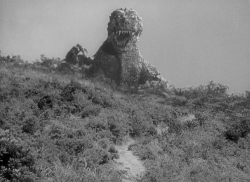
Godzilla
1954 -
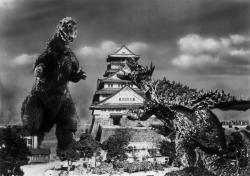
Godzilla Raids Again
1955 -

King Kong vs. Godzilla
1962 -

Mothra vs. Godzilla
1964 -
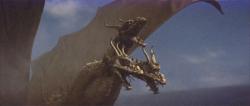
Ghidorah, the Three-Headed Monster
1964 -
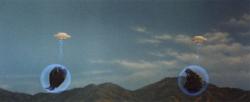
Invasion of Astro-Monster
1965 -

Ebirah, Horror of the Deep
1966 -

Son of Godzilla
1967 -

Destroy All Monsters!
1968 -
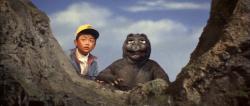
All Monsters Attack
1969 -
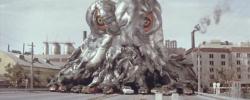
Godzilla Vs. Hedorah
1971 -
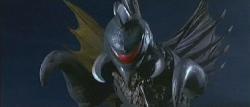
Godzilla vs. Gigan
1972 -
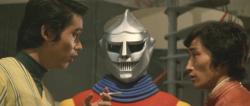
Godzilla vs. Megalon
1973 -
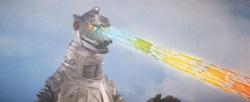
Godzilla vs. Mechagodzilla
1974 -
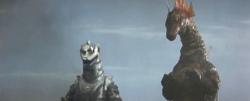
Terror of Mechagodzilla
1975 -
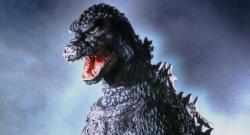
The Return of Godzilla
1984 -

Godzilla vs. Biollante
1989 -
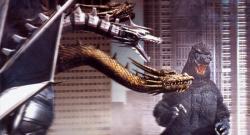
Godzilla vs. King Ghidorah
1991 -
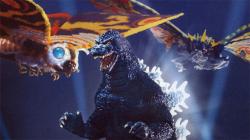
Godzilla vs. Mothra
1992 -
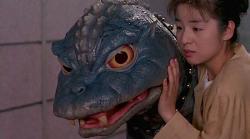
Godzilla vs. Mechagodzilla
1993 -
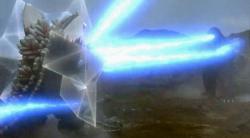
Godzilla vs. SpaceGodzilla
1994 -
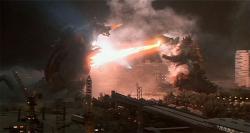
Godzilla vs. Destoroyah
1995 -
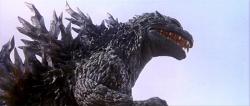
Godzilla 2000
1999 -
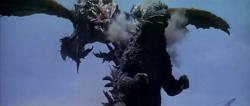
Godzilla vs. Megaguirus
2000 -

Godzilla, Mothra and King Ghidorah: Giant Monsters All-Out Attack
2001 -
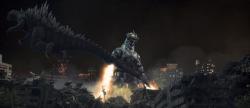
Godzilla Against Mechagodzilla
2002 -

Godzilla: Tokyo S.O.S.
2003 -

Godzilla: Final Wars
2004
We don’t do comments anymore, but you may contact us here or find us on Twitter or Facebook.



